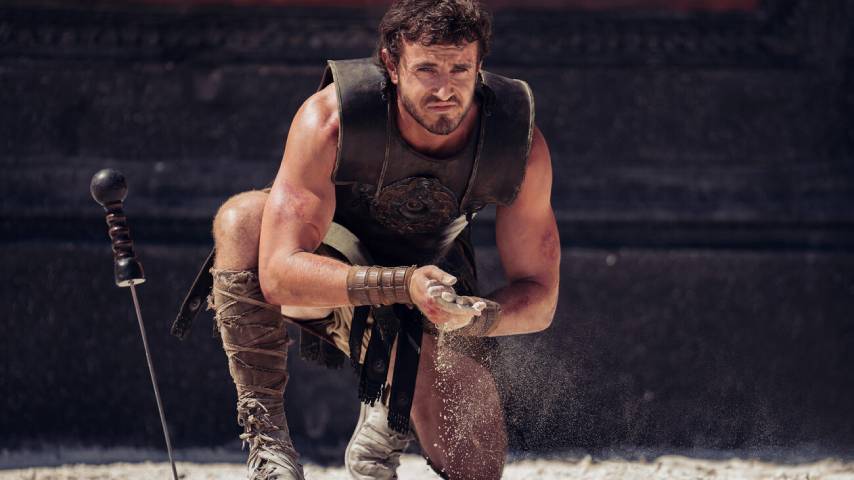Spoiler Space: The hero of Gladiator II is just an echo
What Maximus did in Gladiator echoes eternally through this do-over.
Photo: Paramount Pictures
Spoiler Space offers thoughts on, and a place to discuss, the plot points we can’t disclose in our official review. Fair warning: This article features plot details of Gladiator II.
As Ignatiy Vishnevetsky noted in our review of Gladiator II, Ridley Scott’s long-gestating sequel spends much of its runtime soft-sandaling around the true identity of its lead character, played by Paul Mescal. David Scarpa’s script treats this reveal like a weighty twist, but it would only ever feel that way if you were on the same intellectual level as the film’s CG were-baboons or syphilitic emperors.
Even if you stayed away from all the marketing, it’s clear from the start that Mescal’s Roman exile—initially called Hanno and living in a town on the northern coast of Africa—has a direct association with the characters of the 2000 film. That’s because what the original did in life echoes eternally through this sequel. That’s how so many sequels are now, not just grasping fruitlessly at the magic of what came before, but actively trying to replicate it through crass mimicry. Gladiator II is more obsessed with quoting Gladiator than The Sopranos’ Ralph Cifaretto.
How that manifests here goes far beyond the simple fact that Hanno is actually Lucius Verus Aurelius, son of Lucilla (Connie Nielsen), nephew of Commodus (Joaquin Phoenix), and grandson of Marcus Aurelius (Richard Harris)—true heir of Rome. This is perfectly clear well before he publicly recites Virgil to the little freaks occupying his rightful throne. But that poetry reading leads Lucilla back to his childhood bedroom where, lo and behold, that same verse is inscribed on the ceiling. It’s clear before we see a statue of Marcus Aurelieus as a young man, which looks like it’s just won a viral Paul Mescal lookalike contest. It’s clear before Denzel Washington’s character drunkenly explains Lucius’ identity to us in a ridiculous sequence seemingly included to reassure studio executives that the audience is going to get it, we swear. All of this comes punctuated by endless reminders that Marcus Aurelius had a grand dream for Rome that never came true, a grand dream that could perhaps be fulfilled by someone who shared his bloodline (and face). This element of Lucius’ complicated homecoming would have been plenty to motivate a character, if Gladiator II had any interest in Mescal’s character.
But the script goes further than that. Because he can’t just be Lucius, who lost his country, family, and way of life. He also has to, with a little bit of retconning, be the secret illegitimate lovechild of diehard wife guy Maximus (Russell Crowe). Lucius can’t just be the kid who idolized Maximus, he must be Maximus.
Now, sure, Lucilla and Maximus definitely had a little thing back in the day, and Maximus is unmistakably warm towards Lucius. That’s in the text of Gladiator. I even found a 2006 thread of debate around the topic of Lucius’ true parentage on a “Creative and friendly Russell Crowe fan site” called Crowe Crossing. Before the thread devolves into fan-fiction, the Crowe-heads are pretty much in agreement, though: It’d be pretty stupid if Lucius was Maximus’ literal son and not just a symbolic stand-in for the son he lost at the film’s start.
But Gladiator II is pretty stupid. Sometimes that’s fun—there’s a shark-filled naval battle! A guy reads an ancient Roman newspaper at an ancient Roman café! Denzel Washington says “politicsssss-ah” like he’s The Mask! But when it comes to Lucius, it’s exhausting to watch the film try to build another Death Star Maximus.
Every aspect of Lucius’ character is a shadow of what came before, an empty incantation attempting to conjure up something that’s come and gone. Lucius sticks his sword in the sand in the same way as Maximus, he rubs the same dirt on his hands before the same battles, he recites the same lines, he has similar visions of death, and, eventually, he dons Maximus’ horse-emblazoned armor and wields his sword. Despite not being a general like his dad, Lucius shouts out the same orders to his fellow gladiators, who listen to him seemingly just because he’s the main character.
This guy’s got nothing of his own, and is never convincingly positioned as a willing heir to all this screenplay box-checking. He hasn’t known Rome since he was a child. He especially doesn’t know if Rome has ever been anything other than a vicious empire whose lowest citizens can’t get their rocks off without blood spattered on their faces. So why should he pursue his grandfather’s dream? The film spends so long having Lucius do an impression that it forgets to give him any real drive. He’s just some schmo in a Maximus costume—sometimes literally. Gladiator II tells us that Lucius is connected to Maximus, to Marcus Aurelius, to the first Gladiator. But he’s just an echo.